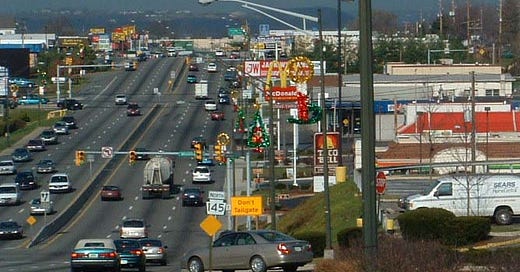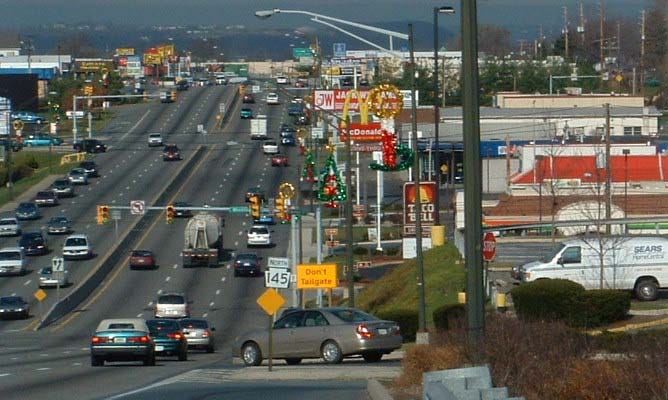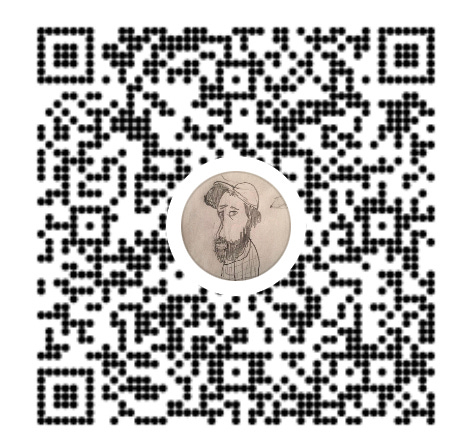The Road Goes Ever On
In a fit of stubbornness the likes of which will one day have me falling off a ladder or perhaps spraying myself in the face with a caustic substance, I replaced a set of brake shoes this weekend. If you’ve ever changed brake drum shoes you know what a fiendishly difficult task this is—there are these retaining springs that look for all the world like coils of wire but are really gateways to the underworld, requiring absurd amounts of force to be channeled through a pair of pliers small enough to fit into a space more appropriate for watch movements than the stopping power of an automobile. I’ve been building my tool collection steadily since I was about 19 and yet I never fail to reach a point when the automobile is no longer driveable but I lack the right tool to finish.
So I began the hourlong walk to the auto parts store to buy a set of brake spring pliers—a fruitless adventure that left me with a cheap pair of tongs that may as well have been made of mashed potatoes for all the brake spring-installing prowess they actually turned out to possess. The ultimate solution is a story for another, far more desperately boring day than today, but suffice it to say I took a walk and a long one at that.
I reckoned it would go faster if I listened to a podcast, so I popped in the old earbuds and hit play on my current love affair, The History of Germany. And so, with the trials and tribulations of Otto III, Holy Roman Emperor, flitting through my brain, I set off. The podcast was sufficient for about a quarter of the journey, at which point my phone battery gave way and left me doing something I honestly haven’t done in a considerable period of time: walking in silence.
Not really silence of course. I’d like to say I was serenaded by birds while a speckled fawn ate Cheerios from my hand and a golden ray of sunshine broke through the puffy white clouds to light the Carter’s Vintage Guitars logo on my baseball cap. But, as might be expected, the auto parts place is on Moreland Ave., a stroad. What’s a stroad? Strongtowns.org defines it thus:
A STROAD is a street/road hybrid and, besides being a very dangerous environment (yes, it is ridiculously dangerous to mix high speed highway geometric design with pedestrians, bikers and turning traffic), they are enormously expensive to build and, ultimately, financially unproductive.
So a street with businesses alongside, but a road you could use to get to Macon.
The sidewalk, such as it is, is situated about six inches from the traffic lanes, which are marked at 45 miles per hour but are typically utilized at something more like 55. Cars buzz past nonstop, thudding over cracks in the pavement and throwing up small sprays of debris. Occasionally a tractor-trailer zooms by making a noise like an earthquake. The concrete beneath my feet is cracked and jumbled, sometimes entirely absent for a few yards, blanketed with vegetation in other areas, and uniformly caked in a thick sediment of sand mixed with fragments of metal and plastic shrapnel—no single piece still large enough to identify its origin. Over the entire mile and a half or so I don’t see a single other pedestrian.
On either side there are plazas. Small plazas, large plazas, none of them anywhere near fancy enough to earn the Italianate word plaza but what else can you call them? Pitstops? Tumors? The dingy plaza that houses Piggly Wiggly and Beauty Depot—a study in sun-bleached window placards of women wearing the latest styles from 1988—is typical. Largely unfrequented behind their vast, vastly optimistic, and vastly empty parking lots, they’ve been there since John Tyler was president, so I suppose someone has no choice but to shop there. It’s not a choice you would take given virtually any alternative.
Walking down this ribbon of misery it occurred to me that in America your proximity to raw infrastructure is inversely proportional to your wealth. Not to say rich folks don’t have infrastructure, but by the time it reaches the mansion, it’s all cleverly concealed, mostly underground, and delivers perhaps more Netflix than cases of Everclear, boxes of knockoff Pringles, and flimsy brake spring pliers. On the other hand, if your life is trending seriously downscale, your front door might overlook a power plant, a multimodal freight exchange point, maybe a prison. Or a highway like this one.
It’s the opposite in places like The Gambia.
At this point I’d like to pull you aside from this essay for just a moment to apologize. I said I wasn’t going to write anymore in these pages about Patrick Mendy, my destitute West African charge. The idea was that I was going to find a bigger venue for his story, but the complexity of the situation has grown faster than my ability to send out a query. I have a bad habit of accumulating tasks that get stuck at a certain stage and no amount of shoving or prodding will get them to move along. My friend and sometime advisor Ken sent me a passage from a Jonathan Rosen book addressing these sorts of things as goses, from the Talmud: “a body between life and death, neither of heaven nor earth.” As my wife and children can attest, I collect goses. It’s a regular gose farm over here.
Meanwhile, Patrick’s story needs to be told. So, my apologies—for removing the topic? For restoring it? Use the apology however you see fit.
When last we visited Patrick things seemed to be getting on track. He’d received the laptop we got him and was applying to college. Everything seemed headed toward a glorious denouement until he went for his college interview and was told he needed to repeat his 12th grade math and science courses. And then, while we attempted to figure out how to solve this problem, he was suddenly evicted from the house in Penyem where he’d lived almost his entire life.
Homeless, with no prospects and no money, Patrick decided to relocate to an even tinier town in the northern part of the country, an hour’s drive from the nearest town of any size, the miniscule port of Barra. I didn’t understand why he would choose such a remote place, with no market either in the village or any of the villages nearby, no easy transportation to anyplace of any significance, and no services of any description at all. Patrick believed that he could find work in the forest north of the village, but this was quickly revealed to be a mirage—it’s almost impossible to get anything in The Gambia if you don’t know someone. It’s that kind of place. So suddenly, faced with a host of problems new and old, we had the added challenge of lacking any coherent resources. Patrick and his family spent their days wandering from village to village looking for food; begging for it typically. On occasion he would catch a ride to Barra where he washed taxicabs for about ten cents each.
And then came the boil. This appeared as a sore spot on his neck that rapidly grew worse until he couldn’t even turn his head. I read up and discovered that boils, especially on the groin, armpits, and neck, can quickly turn septic and without medical attention can easily be fatal. So I wired him $50 to pay the obscene fee required to set foot in a clinic, and sent him to Barra to take care of the matter.
That morning while I slept, my phone lit up with a dozen messages telling a story of confusion and disappointment. He reached Barra but it turned out I had transposed two digits in the tracking code for the money and Western Union wouldn’t let him pick it up. The cab driver was growing increasingly impatient and after a couple hours’ waiting he finally headed back home. I saw his messages maybe twenty minutes after he sent the last one.
I received zero messages from him after that for perhaps three days.
Figuring I’d probably killed him with this stupid oversight, I made attempts to have medical help sent to him, but all I had was a village name. Most roads in The Gambia are unnamed, and there certainly aren’t house numbers. Nobody was willing to drive out and take a look around. I could do nothing but wait in tremulous silence.
And then on the third day he abruptly rose from the dead. While I was out for my afternoon constitutional my phone rang. It was Patrick, attempting to initiate a video call. In the freezing cold and with the great distance between us this proved impractical, but between a series of texts and an audio call later I gathered what had happened. His landlord had had him driven to Farafenni, another small town equidistant in the opposite direction from Barra. There he had put his laptop up as collateral against payment at the clinic, and without further ado the doctor there excised the boil and larded him up with antibiotics and painkillers, telling him he was lucky to be alive.
So in a sense we saved his life. Of course, it was largely accidental, and I prefaced it by almost killing him. I suppose I should have taken that as my cue to stop making decisions for him but fortunately I never learn. As he slowly recovered I quizzed him about the possibility of moving back to the south, somewhere near Brikama, The Gambia’s so-called “Big City.” He didn’t take much convincing, and, with the alacrity of the rootless, within a few days they picked up stakes and moved into an apartment just to the west of Brikima, a place recommended to him by a former school friend. To the delight of both of us, his new place has electricity, though in practice this really just means a single bare light bulb (“bolb,” he told me) in the ceiling and a single outlet he uses to charge his phone. Still, the difference in rent equals what they used to spend on candles each month, so this struck me as an enormous coup.
It wasn’t the last. Only a day after arriving he visited the Brikama market, where he ran into a former teacher who exhorted him to check his email for an official response to his college application. It took a day to hammer out the technical difficulties of this task, but we learned that all that time he’d been trying to figure out how to keep his family fed and going through his life or death struggle an acceptance letter had been sitting in his in box waiting for him.
A week later he was starting classes at the teacher’s school of the College of Gambia, and in two years, God willing, he’ll have a degree and can start his teaching career. This is a much abbreviated account of course. It’s been several months now since this latest chapter of our story started and we’ve had countless conversations. He’s teaching me a bit of Manjago, his native tongue. I tutor him in math and science.
And friends, I’m in deep. I paid his tuition ($180 for half a year) and for the last two months I’ve paid his entire family’s food expenses (about $170). Between the fairly lengthy commute on foot, the long hours at the college, and his chores around the house (Patrick does almost all the cooking and laundry), he’s too busy to work, and his siblings are too young to provide a meaningful contribution. It seemed to me that the best way to move the ball forward was to just shell out the money, so I did.
The funny thing about saving someone is that you become responsible for them. I can’t withdraw my support—it would undo everything we’ve worked toward. It would be like shooting him in the head. But it’s going to be difficult for me to provide this degree of support for two years—I have a kid of my own bound for college this fall, and her tuition is somewhat larger. I’m happy to receive any financial support y’all can provide of course, but suggestions anyone might have on how to make this situation more sustainable over the long haul are particularly welcome. My sole idea is to write a book or get a piece in the New Yorker, which is probably slightly more practical than placing bets on horses, but is certainly slower.
It’s hard to hold the entirety of the last several months in my head, the amazing transformation from destitution to hope. There are still daily challenges and outrages, but Brikama is an honest-to-God city. It has a well-stocked market. There’s a hospital that doesn’t require a 90-minute commercial vehicle ride. The college has Wifi. There are even festivals and soccer matches to enrich the lives of Patrick and his family. He occasionally longs for a bicycle to make his travels easier, and while I can imagine a long daily commute on foot alongside the Gunjar Brikama Highway is every bit as unpleasant as walking down Moreland Ave., his situation highlights the great thing about roads: to focus on the wretchedness of one small cross-section is to miss the point, that a road is a connection to a vast world filled with possibility and opportunity.
If you would like to assist in Patrick’s plight, Venmo your donation to @Fletcher-Moore-3. If you’re not a Venmo person feel free to Paypal me at fletcher@superflet.ch. My public accounting of expenditures is a little out of date but I’ll get that fixed this afternoon. Any ideas for how to improve this financial mess please leave a comment or email me at fletcher@superflet.ch. I really appreciate the help and I know Patrick does too.






